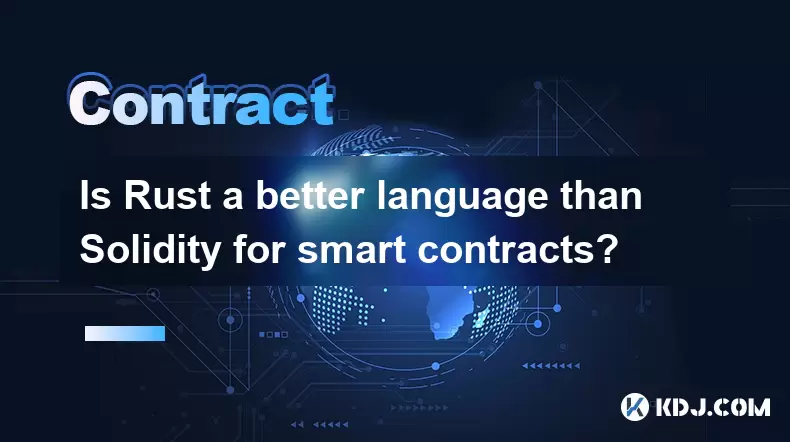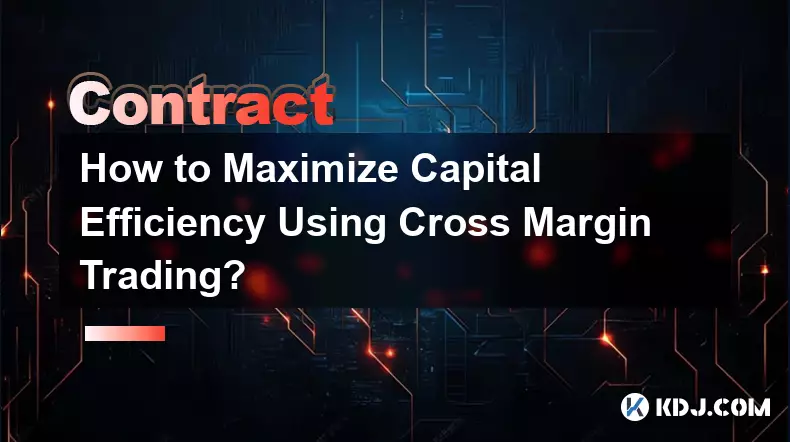-
 bitcoin
bitcoin $87959.907984 USD
1.34% -
 ethereum
ethereum $2920.497338 USD
3.04% -
 tether
tether $0.999775 USD
0.00% -
 xrp
xrp $2.237324 USD
8.12% -
 bnb
bnb $860.243768 USD
0.90% -
 solana
solana $138.089498 USD
5.43% -
 usd-coin
usd-coin $0.999807 USD
0.01% -
 tron
tron $0.272801 USD
-1.53% -
 dogecoin
dogecoin $0.150904 USD
2.96% -
 cardano
cardano $0.421635 USD
1.97% -
 hyperliquid
hyperliquid $32.152445 USD
2.23% -
 bitcoin-cash
bitcoin-cash $533.301069 USD
-1.94% -
 chainlink
chainlink $12.953417 USD
2.68% -
 unus-sed-leo
unus-sed-leo $9.535951 USD
0.73% -
 zcash
zcash $521.483386 USD
-2.87%
Is Rust a better language than Solidity for smart contracts?
Rust and Solidity each offer unique advantages for smart contract development, with Rust excelling in performance and safety, while Solidity leads in Ethereum ecosystem maturity and developer accessibility.
Jul 17, 2025 at 10:29 am

Understanding the Role of Programming Languages in Smart Contracts
Smart contracts are self-executing agreements with terms directly written into code. They run on blockchain platforms and form the backbone of decentralized applications (dApps). The choice of programming language for writing smart contracts is crucial, as it affects security, performance, and developer experience. Rust and Solidity are two languages that have gained attention in this space, but they serve different ecosystems and come with distinct advantages.
What Is Solidity and Why It's Widely Used
Solidity is a statically-typed programming language specifically designed for writing smart contracts on the Ethereum Virtual Machine (EVM). It was developed to be familiar to developers who know JavaScript, C++, or Python. Its syntax resembles these languages, which makes it relatively easier to learn for many developers entering the blockchain space.
One of the main reasons for its widespread adoption is its deep integration with the Ethereum ecosystem. Tools like Truffle, Hardhat, and Remix provide robust environments for deploying and testing smart contracts. The EVM compatibility ensures that any contract written in Solidity can interact seamlessly with other Ethereum-based contracts and dApps.
Additionally, Solidity has mature documentation, a large community, and extensive libraries such as OpenZeppelin, which offer reusable components for secure contract development.
Exploring Rust in the Context of Smart Contracts
Rust is a systems programming language known for its focus on safety, performance, and concurrency. Unlike Solidity, Rust is not specifically built for smart contracts. However, it has found use in blockchain development through platforms like Solana, NEAR Protocol, and Polkadot’s Substrate framework. These platforms allow developers to write smart contracts—often referred to as 'on-chain programs'—in Rust.
Rust’s memory safety guarantees without garbage collection make it an attractive option for high-performance environments, especially where runtime efficiency and low-level control are essential. This feature is particularly beneficial for blockchains that require fast execution and scalability.
Furthermore, Rust supports WebAssembly (Wasm), which is increasingly used in modern blockchain architectures for executing smart contracts efficiently across different virtual machines.
Comparing Security Features Between Rust and Solidity
Security is a critical aspect of smart contract development due to the irreversible nature of blockchain transactions. Solidity has historically been prone to various vulnerabilities such as reentrancy attacks, integer overflows, and unchecked external calls. While tools like Slither and Mythril help detect issues, the responsibility often lies heavily on the developer.
In contrast, Rust enforces memory and thread safety at compile time, significantly reducing the risk of certain classes of bugs. Its ownership model prevents dangling pointers and data races, which are common sources of errors in systems programming. When applied to smart contract development, this means fewer opportunities for runtime errors that could be exploited.
However, even though Rust mitigates many traditional programming pitfalls, it does not inherently prevent logic errors or economic vulnerabilities in smart contracts. Developers still need to apply rigorous testing and auditing practices regardless of the language used.
Evaluating Developer Experience and Ecosystem Support
The learning curve and tooling support play a significant role in choosing a smart contract language. Solidity benefits from a vast array of educational resources, including tutorials, forums, and courses tailored to beginners and advanced users alike. Its ecosystem includes well-established frameworks and deployment tools that streamline development workflows.
On the other hand, Rust requires a deeper understanding of systems programming concepts, which can be challenging for newcomers. However, once developers become proficient, they gain access to powerful abstractions and high-performance capabilities. Rust also boasts excellent tooling, including Cargo for package management and Clippy for linting, which contribute to a productive development environment.
It's important to note that while Rust offers strong tooling, the blockchain-specific tooling for smart contract development (like Anchor for Solana) is still evolving compared to Solidity’s more mature offerings.
Performance Considerations in Contract Execution
When it comes to performance, Rust generally outperforms Solidity due to its compilation to native machine code and efficient memory management. This advantage becomes more pronounced in high-throughput blockchains like Solana, where execution speed is a priority.
Solidity, being compiled to EVM bytecode, runs in a sandboxed environment that prioritizes determinism and portability over raw speed. While optimizations exist, the inherent limitations of the EVM can cap performance improvements.
For projects requiring intensive computation or minimal latency, Rust may be the preferred choice. For those focused on interoperability within the Ethereum ecosystem, Solidity remains dominant.
Frequently Asked Questions
1. Can I use Rust to write smart contracts for Ethereum?No, Ethereum currently only supports languages that compile to EVM bytecode, such as Solidity, Vyper, and Yul. Rust is not compatible with the EVM unless transpiled, which is not standard practice.
2. Is it harder to find developers proficient in Rust than in Solidity?Yes, Rust has a steeper learning curve, especially for developers without systems programming experience. Solidity, being more accessible and widely taught in blockchain contexts, has a larger pool of developers.
3. Do Rust-based smart contracts offer better upgradability than Solidity ones?Upgradability depends more on the design patterns and platform architecture rather than the language itself. Both Rust and Solidity can implement upgradeable contracts using proxy patterns or module-based designs.
4. Are there formal verification tools available for Rust smart contracts?While Rust’s compiler helps catch many errors, formal verification tools are more mature in the Solidity ecosystem (e.g., CertiK, ChainSecurity). However, research and development in formal verification for Rust-based contracts are progressing, particularly in academic and enterprise-grade blockchain implementations.
Disclaimer:info@kdj.com
The information provided is not trading advice. kdj.com does not assume any responsibility for any investments made based on the information provided in this article. Cryptocurrencies are highly volatile and it is highly recommended that you invest with caution after thorough research!
If you believe that the content used on this website infringes your copyright, please contact us immediately (info@kdj.com) and we will delete it promptly.
- Bitcoin Drops Amidst Analyst Warnings and Shifting Market Sentiment
- 2026-02-05 09:40:02
- Georgia Brothers Sentenced to 20 Years for Elaborate COAM Gambling Fraud Scheme
- 2026-02-05 09:45:01
- MicroStrategy Stock Loss: Pension Funds Face 60% Plunge Amidst Crypto Volatility
- 2026-02-05 10:55:01
- Super Bowl LX: Teddy Swims, Green Day, and a Legacy Toss Set for 2026 Extravaganza
- 2026-02-05 07:20:02
- Fantasy Football Premier League Round 25: Key Player Picks, Tips, and Advice for Optimal Team Performance
- 2026-02-05 07:15:02
- Remittix Launches PayFi Platform with a Generous 300% Bonus Offer, Driving Investor Excitement
- 2026-02-05 07:05:01
Related knowledge

How to Manage Emotions and "Revenge Trading" in Futures?
Feb 05,2026 at 12:19am
Understanding Emotional Triggers in Futures Markets1. Market volatility directly impacts psychological states, often amplifying fear or euphoria based...

How to Analyze Market Sentiment Using the Fear and Greed Index?
Feb 05,2026 at 07:40am
Understanding the Fear and Greed Index1. The Fear and Greed Index is a composite metric designed to quantify prevailing emotional states among cryptoc...

How to Use Volume Profile to Find Key Futures Entry Levels?
Feb 04,2026 at 11:39pm
Understanding Volume Profile Structure1. Volume Profile displays the distribution of traded volume at specific price levels over a defined time period...

How to Trade Bitcoin Futures with 100x Leverage? (High-Risk Setup)
Feb 05,2026 at 11:00am
Understanding Bitcoin Futures Mechanics1. Bitcoin futures contracts represent agreements to buy or sell BTC at a predetermined price and date in the f...

How to Maximize Capital Efficiency Using Cross Margin Trading?
Feb 05,2026 at 12:40am
Cross Margin Trading Fundamentals1. Cross margin trading allows traders to use their entire account balance as collateral for open positions across mu...

How to Trade Crypto Contracts During Major News Events? (CPI/FOMC)
Feb 05,2026 at 09:59am
Understanding Market Sensitivity to Macro Data Releases1. Cryptocurrency futures markets exhibit pronounced volatility during U.S. CPI and FOMC announ...

How to Manage Emotions and "Revenge Trading" in Futures?
Feb 05,2026 at 12:19am
Understanding Emotional Triggers in Futures Markets1. Market volatility directly impacts psychological states, often amplifying fear or euphoria based...

How to Analyze Market Sentiment Using the Fear and Greed Index?
Feb 05,2026 at 07:40am
Understanding the Fear and Greed Index1. The Fear and Greed Index is a composite metric designed to quantify prevailing emotional states among cryptoc...

How to Use Volume Profile to Find Key Futures Entry Levels?
Feb 04,2026 at 11:39pm
Understanding Volume Profile Structure1. Volume Profile displays the distribution of traded volume at specific price levels over a defined time period...

How to Trade Bitcoin Futures with 100x Leverage? (High-Risk Setup)
Feb 05,2026 at 11:00am
Understanding Bitcoin Futures Mechanics1. Bitcoin futures contracts represent agreements to buy or sell BTC at a predetermined price and date in the f...

How to Maximize Capital Efficiency Using Cross Margin Trading?
Feb 05,2026 at 12:40am
Cross Margin Trading Fundamentals1. Cross margin trading allows traders to use their entire account balance as collateral for open positions across mu...

How to Trade Crypto Contracts During Major News Events? (CPI/FOMC)
Feb 05,2026 at 09:59am
Understanding Market Sensitivity to Macro Data Releases1. Cryptocurrency futures markets exhibit pronounced volatility during U.S. CPI and FOMC announ...
See all articles










































































